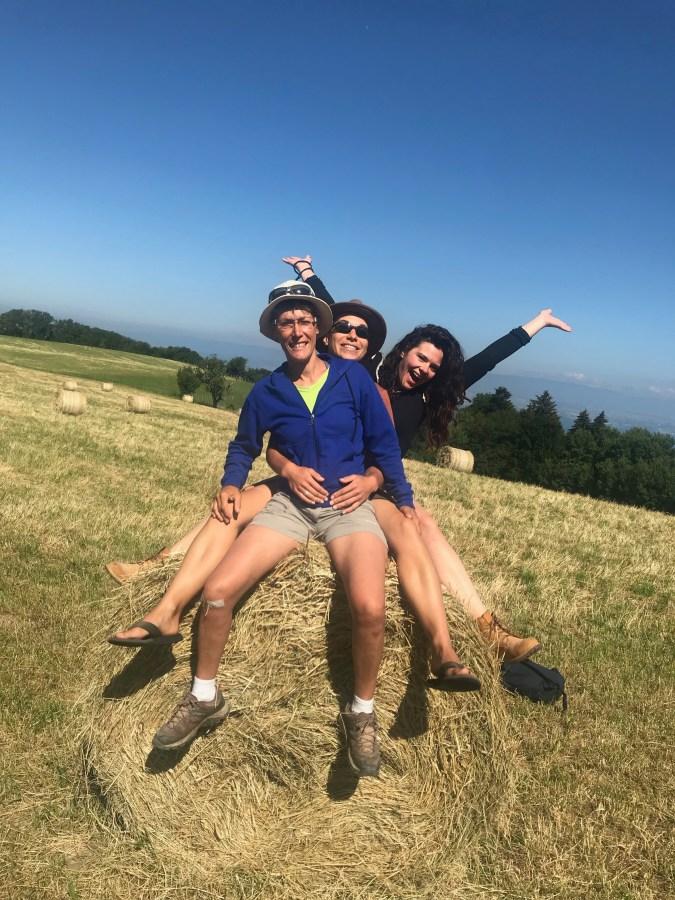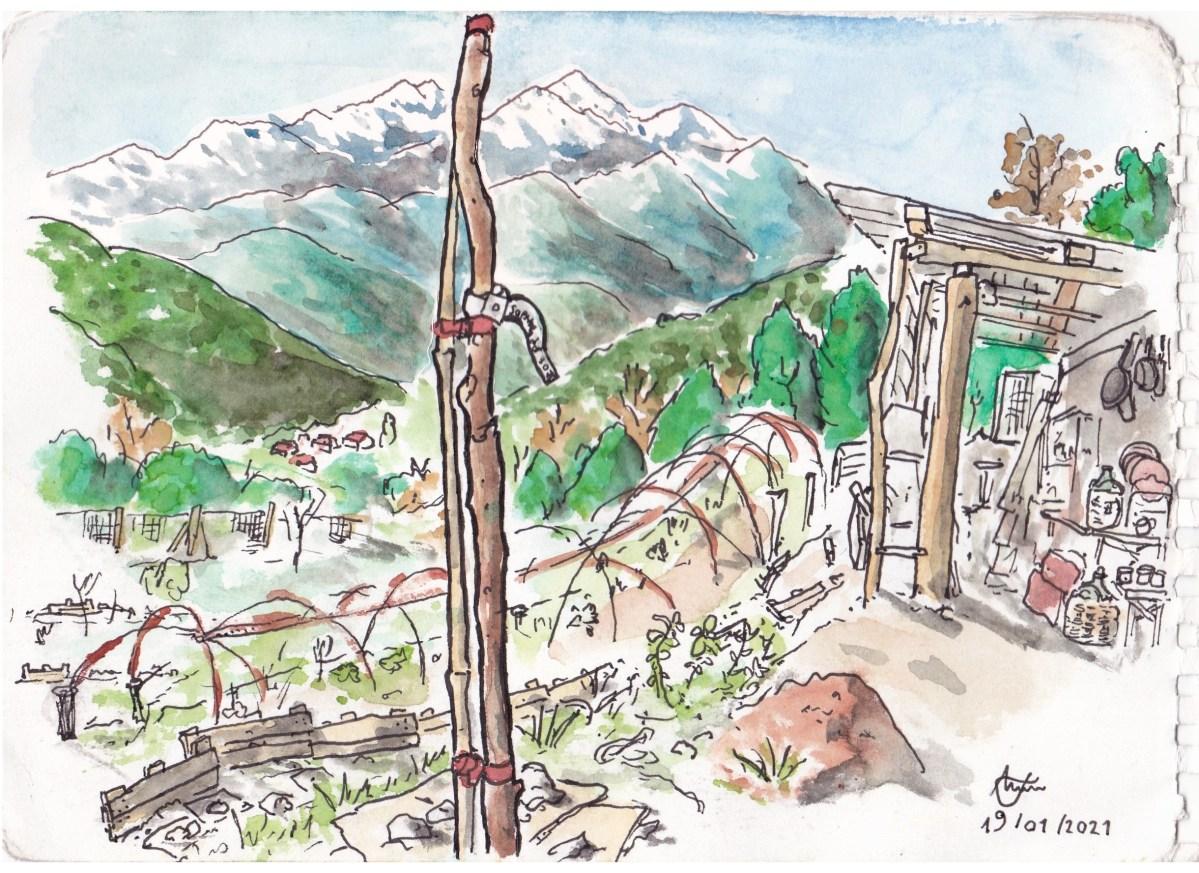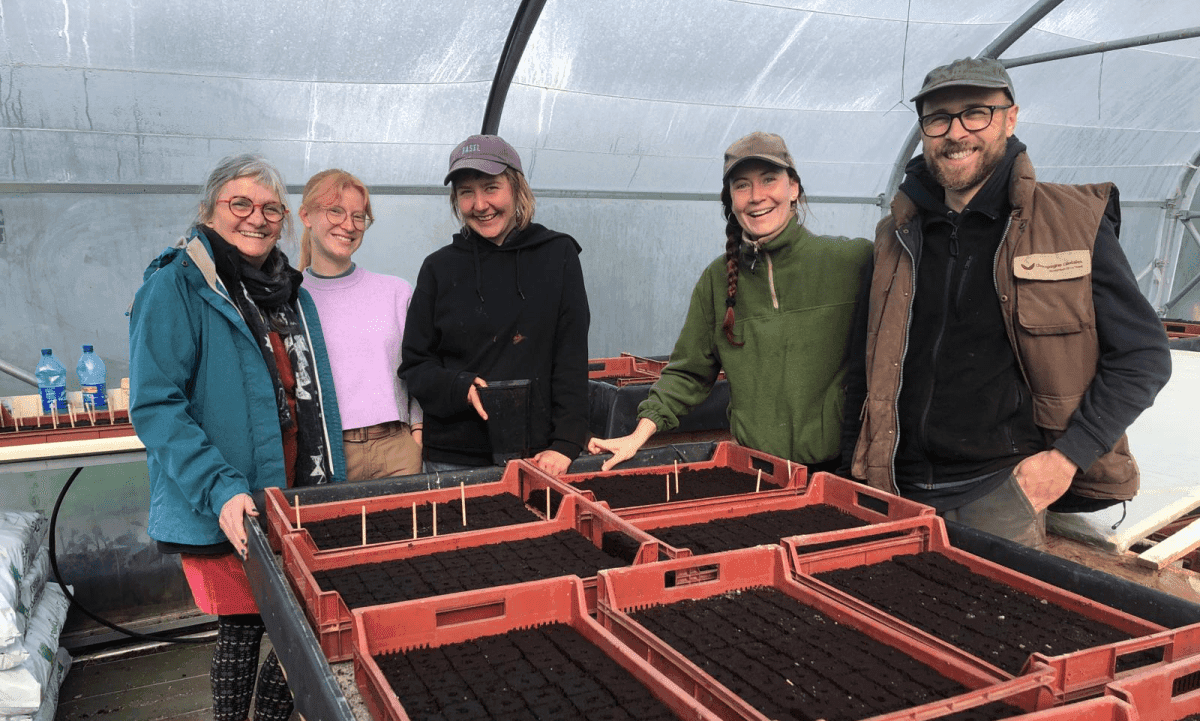
An American Débutante's Experience WWOOFing in France and a "Renewed Sense of Meaning"
Packing my bag to head to Haute-Savoie, I donned a pair of working boots and left my expectations in the city. With a curious and eager spirit, I opened up to an alternative way of engaging with my environment and share those impressions of living and working on an organic farm in France.

I started WWOOFing in France in the spring of 2018 (and continue to do so periodically when nature calls) with my first farm having been in Evian, France. I know what you’re thinking; and yes, it is where the bottled water comes from!
I didn’t go there for that reason, but because I was interested in a) trying out this WWOOFing I had heard of through a friend; b) exploring a new way of traveling that aligned with my values and beliefs in sustainability and in eco-travel; and c) I wanted to explore a new region of France I had not been to before and my hosts were open to receive me as their first WWOOFer.
So, after my classes finished in the Spring, off I went to stay with Alex and Via: a french couple who were practicing urban sustainable living and permaculture in the town of Evian. Sustainable living and organic farming practices in the city—Is it possible? I thought. Not only is it possible, but also it's immensely important for the future.
My host inevitably became a sort of WWOOFing guru for me—an experienced veteran who would show the ropes and profoundly influence me in the philosophy of a sustainable, organic lifestyle.
She picked me up from the train station just in time for lunch (a beautiful salad made from all ingredients picked in their “potager” or veggie garden). My host Alex was so natural and patient with me.
I was fascinated by her and the lifestyle she led—having WWOOFed for 15 years non-stop all over the world—and now that she had a sustainable place with her partner, they wanted to open their home and share with other WWOOFers. I didn’t stop asking her questions from the moment I arrived until my departure. She inevitably became a sort of WWOOFing guru for me; an experienced veteran who would show the ropes and profoundly influence me in the philosophy of a sustainable and organic lifestyle.
WWOOFing—What is it?
One of the first conversations we had when I arrived to their home was about the work, or how to organize ourselves into a rhythm of work/play conducive to all parties. “We don’t care when you want to work—morning, afternoon—whichever fits you best, just as long as you put in the 20-25 hours per week,” they explained to me. It could be five hours a day five days a week, or more hours one day, less on another, etc. We decided on the former: I worked five hours in the morning, 8am to 1pm, five days a week. That way I had my afternoons off and two free days to explore the area or have leisure.
WWOOFing is an an exchange.
For being self-autonomous, taking WWOOFers was a way for them to share the practices they believed in, get an eager helping hand in the process, and also to have exchanges and diversity from all over the world.
They were even environmentally mindful in the set-up of their home. For instance, there was a compost toilet and a water system they rigged to collect the excess from activities such as washing dishes that they could then reuse to water the plants.
In my later WWOOFing experiences, I would come to encounter hosts that employed all kinds of techniques—one guy that built his own home out of plastered straw and wood and used solar panels for energy. Or another who collected rain water.

I would start after breakfast in the morning and finish at lunch time. The work was dynamic and varied and they always asked me if I was okay with the tasks proposed.
I learned about permaculture while working in their gardens, which is what I was initially interested in. They were always so patient...teaching me things along the way, like how you can eat the flowers that grow off of zucchini—put them in salads or fry them up for a tasty appetizer. Or how you can use the grass you’ve cut from the yard to put around the base of plants to protect from the sun in summer.
The confines of the boxy Parisian life had come down and I felt infinite and vital again—like there was a renewed sense of meaning in my life.
It wasn't until one day, hard at work hacking down an old wall, that a parallel, metaphorical 'wall' within me also came down. And boy, did it feel goooood.
Back in Paris, I was feeling stuck—stuck in the same cycles of métro boulot dodo, as they say.
Something finally pushed me to take-off and do something out of the norm: to live with strangers and adjust to the beat of their lifestyle, to take-up a pic ax and feel my body move in new ways that a desk chair doesn't allow for, to be working in the raw elements—feeling the warm sun on my skin and the fresh open air expand my lungs...
Something inside of me shifted. The constraints of the boxy Parisian life had come down and I felt infinite, vital again. And like there was a renewed sense of meaning in my life.
The water was so fresh you could drink it straight from the source.
After lunch at 1 p.m., the rest of the day was my leisure time that I could spend to my liking. I was finishing a paper for a class at the start of my stay, but after, I would explore the city and the surroundings.
For a couple of my days off, I walked to the dock and took a ferry over to Geneva, Switzerland (a 30 minute ride). Sometimes I did activities with my hosts. On one beautiful day, they brought me to a scenic spot in the mountains to hike. Alex would point out plants every now and then, we would discuss environmental subjects we were passionate about, and the water was so fresh you could drink it straight from the source.

Alternative traveling.
WWOOFing is many things. It’s a way to travel off the beaten path—getting out of personality-less hotels and pricey tourist traps and into local’s homes and lives. At Alex and Via’s, I only spoke French for the most part. I learned things I would never learn staying at an Air Bnb by myself or with other Americans.
I got to experience how they live and go about their lives, learn new things about French culture and even new words. Like “mauviette” from how Alex jokingly teased Via when she was too scared to take a swim with us in the chilly water of Lac Léman. I taught Via the English word for “wheelbarrow” and one lunch we made tex mex tacos. She in turn taught me how to sand wooden windows and taste some of the local Haute-Savoie cheeses.
WWOOFing was a way for me to take capitalism out of a means of experiencing travelling and people, and putting respect, wholesomeness, and generosity in its place.
I was able to meet others who held the same values as I regarding eco-sustainability and organic. People who were more connected with the land. I had found my tribe in WWOOFing.
It then became about holistic living in all facets of life, not only organic food but also organic exchanges and relationships with other people—not based around money, transactions, or profit, but around deeper values and practices that are becoming more imminent in a strife-stricken world of consumerism, globalization and distraction.
WWOOFing was a way for me to take capitalism out of a means of experiencing places and people—putting respect, wholesomeness, and generosity in its place.
I too one day want to have my own sustainable farm and home.
Little did I know that that first experience WWOOFing would come to play such an integral role in my life and who I would become. Since then, I’ve gone to other farms, and bit by bit my own personal journey has changed and been influenced by what I’ve learned in the process. I too one day wish to have my own sustainable home and I've also found a calling as a writer working in the niche of sustainable and alternative lifestyles.
WWOOFing is the only way I now slow travel to authentically engage with the traditions of local people and the spirit of place.
Others, too, I’ve encountered along the way have expressed similar desires. An American couple I met on one farm had been WWOOFing all over Italy and France to learn their hosts’ "best-practices" in order later start their own organic farm in the U.S.
But perhaps the most influential WWOOFers I met were a couple from Brazil. They had been at this non-stop for three years, all over, and said they would do it for the next ten—making it a sort of sustainable lifestyle.
Experience for yourself all WWOOFing has to offer to you, and you to it.
All in all, WWOOFing is the only way I now slow travel to authentically engage with the ways of local people and the spirit of place. You’re welcomed into homes instead of hostels. You meet locals and taste authentic farm fresh food. You can give something back to the hosts and enrich their lives.
If your body able and your spirit willing, try a world wide opportunity on an organic farm in France, and feel alive in all your senses. Hoe the earth with your hands, hear the soft murmur of the french language, taste local Camembert cheese, smell the lavender fields of Provence, hike to and see the view from atop a mountain in the alps. Experience for yourself all it has to offer to you, and you to it.
Bon WWOOFing !
Lire davantage
Une fois par saison, l'actualité du WWOOFing par email

